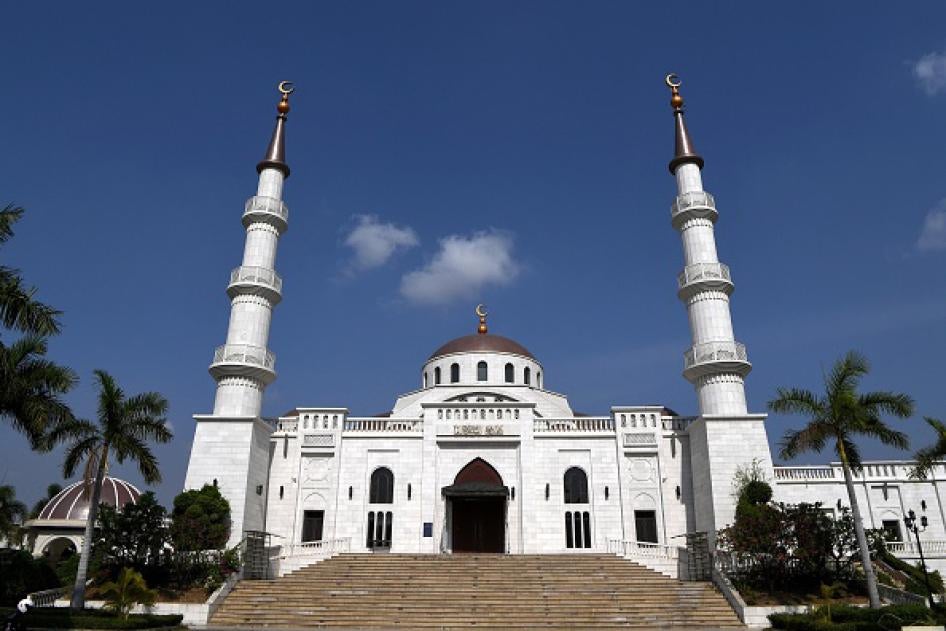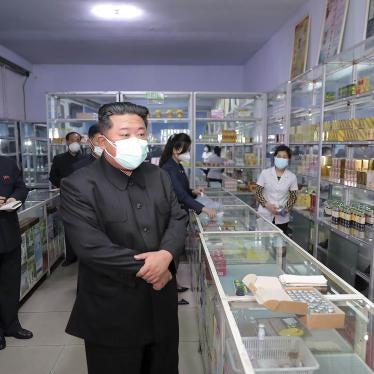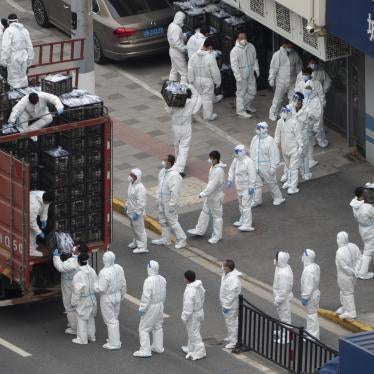(Bangkok) – Cambodian authorities should cease using inflammatory rhetoric against vulnerable groups and foreigners in the context of the coronavirus pandemic, Human Rights Watch said today. In order to protect individuals with COVID-19 from discrimination and violence, the government should limit the release of personal information such as ethnicity, race, religion, political affiliation, and sexual identity.
On March 17, 2020, the Health Ministry posted on its official Facebook page an update of positive COVID-19 cases and made reference to specific groups of people who contracted the virus, including “Khmer Islam.” This post led to an outburst of discriminatory and hateful comments online, and discriminatory daily interactions at markets, shops, and community areas against Cambodia’s minority Muslim communities.
“The Cambodian government should act to ensure there is no discrimination against vulnerable groups and foreigners in its response to the COVID-19 pandemic,” said Phil Robertson, deputy Asia director. “Government leaders should formally apologize to Cambodia’s Muslim communities for the Health Ministry’s discriminatory statement and meet with community members to show their support.”
The Health Ministry reportedon March 17 that 11 “Khmer Islam returning from a religious ceremony in Malaysia” had tested positive for the COVID-19 virus, a reference to the mass pilgrimage outside Malaysia’s capital, Kuala Lumpur, between February 27 and March 1. The coronavirus reportedly spread among a crowd that reached 16,000 people. As of March 30, there were 107 cases of COVID-19 reported in Cambodia.
Subsequent statements by the Health Ministry on March 18 and March 19 dropped reference to their religion, using instead the general term “Khmer.” However, the government has not apologized for the March 17 statement, nor taken steps to address the harmful public response.
Members of the public posted hateful Facebook comments in reaction to the Health Ministry’s original statement, blaming Cambodia’s Muslim communitiesfor the spread of the virus in the country. Cambodian Muslims, particularly in Phnom Penh, have since reported facing discrimination, such as people refusing to sell or buy products from them, or to exchange money. Others reported that Cambodians of non-Muslim faith put on face masks as soon as they saw members of Muslim faith come into their vicinity.
A government spokesperson, Phay Siphan, sought to contain the damage by asking the media to not use identifying information about people infected with COVID-19. A week later, Interior Minister Sar Kheng said that Prime Minister Hun Sen had declared “that there is no need to divide between Cambodian Muslims, this Khmer, that Khmer. We don’t need to discriminate against Cambodian Muslims. No matter which nationals come to Cambodia during this problematic time, we mustn’t discriminate against them either.” On the same day as the Health Ministry announcement, Prime Minister Hun Sen announced a ban on all religious gatherings.
However, the government has not taken concrete steps to end discriminatory actions. The government has also suggested that foreigners are solely responsible for the spread of the virus. VOD News reported on March 25 that Health Ministry spokesman Ly Sovann stated, “Most of the cases were brought in from outside, and there is no sign of transmission between people in their [local] communities.”
Public health researchers have found that the extreme quarantine measures in Hubei, China delayed spread of the disease within the country. However, travel bans such as those imposed in Cambodia and elsewhere will not be enough to prevent local transmission and countries should urgently implement social distancing, widespread testing and contact tracing, and supervised isolation of individuals found to be infected.
After banning foreigners from Italy, Germany, Spain, France, and the United States from entering the country for 30 days effective March 17, on March 27, the Cambodian government suspended all visa exemptions and issuance of tourist visas, e-visas, and visas on arrival to any foreigner and imposed strict conditions for foreigners seeking any visa for Cambodia. Cambodia had not, however, banned travelers from China, the epicenter of the COVID-19 outbreak.
Discriminatory actions against foreigners in Cambodia appear to be on the rise, Human Rights Watch said. Expatriates have increasingly reported on social media that they have been denied entry into shops and establishments in Phnom Penh and other places. The government has not taken any action, though shop owners have posted signs in English refusing entry or service to foreigners. In some locales, signs have been posted claiming in English that the shop was closed while Khmer language signs indicate the shop was “open as usual.”
On March 19, the US Embassy in Cambodia put out a travel and security alert for Cambodia,stating:
The U.S. Embassy has received reports of harassment or discrimination directed at expatriates related to COVID-19 developments. Security personnel have forcibly closed some restaurants and bars frequented by expatriates. While these incidents to date have been isolated, local authorities may continue to take these steps without warning or consistency.”
The World Health Organization (WHO) has recognized the spread of stigma and discrimination during the pandemic and has consequently put out examples to counter stigmatization of groups in times of a new disease. These include: “Spreading the facts: Stigma can be heightened by insufficient knowledge about how the new coronavirus disease (COVID-19) is transmitted and treated, and how to prevent infection.” The United Nations Committee on Economic, Social and Cultural Rights has recognized that the right to health is closely related and dependent upon other rights, including nondiscrimination, and that both prevention and treatment should be available without discrimination.
A Human Rights Watch report on the human rights dimensions of the COVID-19 response analyzes government obligations and human rights concerns posed by the coronavirus outbreak. Among others, governments should ensure that information on the spread of COVID-19 is provided in a timely, transparent, and accurate manner, without putting anyone at risk of discrimination or violence. Governments should also guarantee that patient confidentiality is protected, even as authorities take steps to identify those who may have been exposed to the virus.
“The WHO and other international agencies should call upon the Cambodian government to focus its communications around COVID-19 responses on accurate and timely facts,” Robertson said. “It should cease any public statements that encourage hatred, discrimination, and violence against any specific groups or people living in Cambodia.”








